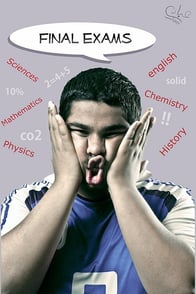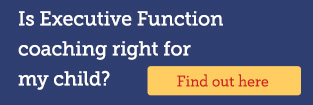If you've got final exams next week, this blog post is filled with helpful test prep tips, including what NOT to do when preparing for final exams (or any test, for that matter).
The last time I broke out into hives was when a new student I was working with said she was “looking over her  notes” to prepare for an upcoming exam.
notes” to prepare for an upcoming exam.
You see, that passive eyeball approach is up at the top of an academic coaches’ list of What Not To Do When Studying For Finals. In between scratching (due to my allergy to ineffective study habits), I explained to my student that if she’s not actively grappling with the material by testing her recall and understanding, she may as well be spending her time getting a mani-pedi for all the good it will do her on test day.
“But this is how I always get ready for tests!” she explains, handing me calamine lotion.
“Uh huh. And how’s that method working for you?”
“Well, I’m just not a great test-taker, that’s all.”
And there it is: the difference between preparing for the test and taking the test. Oftentimes students believe that they are poor test takers if they are unable to recall information when it's game time, but in many cases the experience of going blank is actually tied with the test prep the student did before exam day.
I replied, “I’m not convinced of that. Maybe you’re just not studying with enough ooomph. Are you willing to try something different this time?”
Here are some cures for Bad-Test-Taker-itis I prescribed for my student. Maybe you know someone who needs a little test prep guidance too, especially if they are studying for finals. Y'know, clicking that share button at the bottom of this post is WAY easier than nagging, right?
Be Present and Stay Focused
One of the best test prep tips is to be focused in class. Prepare for class by doing assigned reading and completing your homework, staying focused on your homework (plenty of time for social media when you're done with your homework). Participate. Ask questions. Each day new nuggets of knowledge are nestling into your neurons. Turns out, learning is most effective in these smaller chunks, over time. Students aren’t simply biding time until baseball practice or play rehearsal during class. The savvy ones know that they are preparing for the exam while dissecting that sheep’s lung in biology.
So, the test was just announced? No sweat. Put on your Sherlock Holmes cap and get ready for the next step in test prep.
Be a Detective
Hunt for clues in your notes and on your class website. Did Mr. Pirelli mention the theme of The American Dream every day for a month? Chances are this will feature prominently in the exam. Justify what material you deem important to study. “Well, I have this underlined about twenty times in my notes, so I can tell Ms. Jackson really wants us to know cellular respiration inside and out for this test.”
Scour the course syllabus. Often, teachers put essential questions that frame the units they’re covering: Was the Civil War unavoidable? Wherever you see an essential question, treat it like the pure gold that it is, and study by preparing a thorough, elaborated response to demonstrate you understand the relevant info about the topic.
Study your previous tests and quizzes. Often, there are similar questions on the final exam. Figure out what you already know (which answers you got right), and which answers you got wrong (which you might need to brush up on). Did you mix up timelines? Then you better get that straight this time around. Were there some surprise questions from a handout? Make sure you track down and review those handouts as well.
OK, now you’re ready for the next test prep tip as you are studying for finals. Take off the Sherlock Holmes hat, because you’ll need access to your cranium.
Trade Brains with the Teacher
Brains aren’t just tasty zombie snacks. Borrow your teacher’s brain in order to think like a teacher. Now that you’ve completed your detective work to determine the important topics, examine your notes, syllabus, textbook, and handouts. Then imagine you are a teacher who will be testing students on this material. Now, create the test. Really. You see, by forcing yourself to formulate the questions, you are more deeply thinking and actively manipulating the material. That, my friend, leads to deeper understanding and richer connections in your grey matter. That generally leads to better results on tests. Better yet, buddy up with a fellow student who has also used this approach and test each other. That can make studying for finals a bit more fun and give the passive studying approach the old one-two punch!
Now hand back Mr. Flores’ brain. He needs it for class tomorrow.
We know that the end of the year is within tantalizing reach. But first there’s a small hurdle to jump over.
The Finals Finale
Yes, I said that most dreaded of all f-words: Finals. Final exams are fast approaching. But there’s good news! For the most part, you are simply reactivating old learning that happened over the past school year. So you’re not cramming in a ton of new things into your head. Rather, you are dusting off those memories you’ve filed away. The most efficient way to remove the accumulated crud when studying for finals is to test yourself before even reviewing your study materials.
Most teachers provide some sort of guide that lists themes and topics covered on the final. Sit yourself down and pretend it’s a pop quiz. Write down all you remember about the topics without taking any sneak peeks at your notebook. And without Googling (or using AI). This method forces those file drawers in your brain to open. It should be hard. Perhaps some sweat will form on your furrowed brow. Good! The more mental energy you use to recall this information, the better connections that will form in your brain. All that exercise will help you remember important material when you need it most. Additionally, this strategy gives you a clear way to triage your studying. Nailed the Pythagorean theorem? No need to review it. Drew a blank on Chinese dynasties of the 12th century? Fish through the textbook to clear that up.
Here are a few test prep tips from Harvard,for the days before, the night before, and the morning of your exam.
Want to learn more about how an Executive Function coach can help your child study more effectively? Click below to contact us for a free consultation.
photo credit: photopin (license)

Jackie Stachel is the Public Relations Director for Beyond BookSmart. She joined the company in 2010 and is based in our Boston branch. Jackie leads Executive Function presentations for parent groups throughout Massachusetts and Rhode Island. Additionally, Jackie manages our You Tube channel as well as our company blog content through editing submissions, writing articles, and collaborating with professionals from outside Beyond BookSmart to create useful, informative content. Finally, Jackie coaches students supporting them in learning and developing Executive Functioning strategies.

